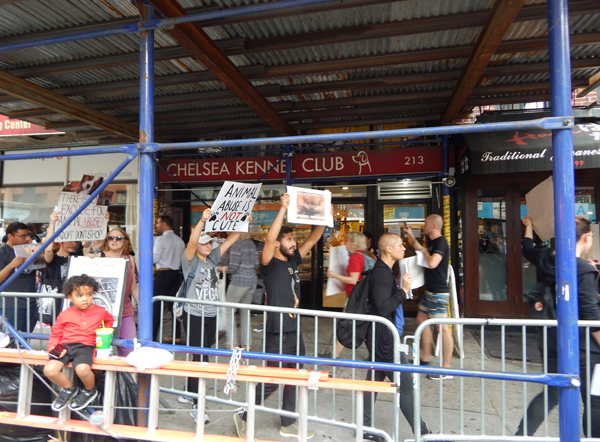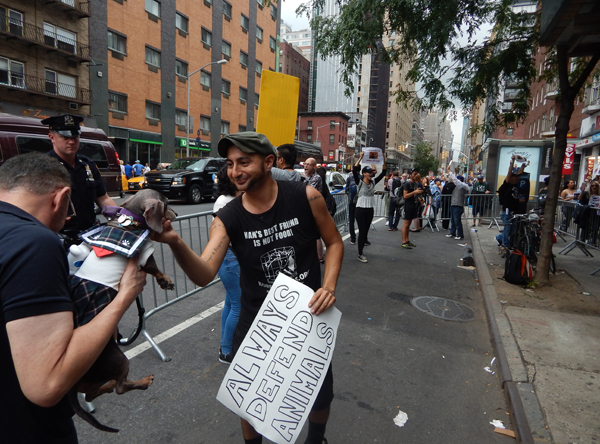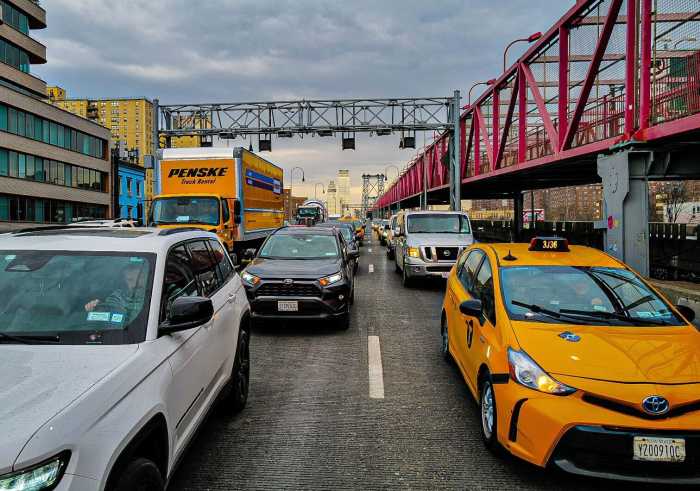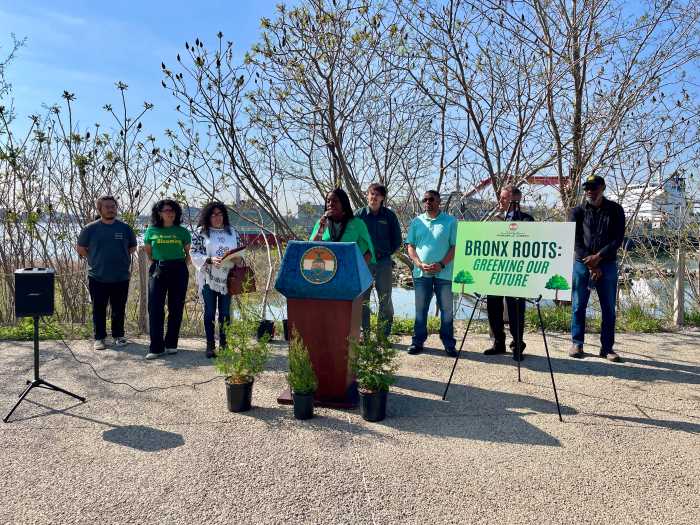
BY WINNIE McCROY | A chic puppy boutique is in the crosshairs of city agencies and animal rights activists this week after a two-month undercover investigation by The Humane Society of the United States (HSUS) revealed sick dogs were being sold to unsuspecting customers. The owner insists she is an animal lover who would never neglect a dog’s health, but the animal welfare organization contends that the only doctoring going on was of the puppy mill pooches’ veterinary files.
“I’ve been a vegetarian for 40 years; I won’t even eat an animal. I could never hurt an animal!” owner Dana Derragh, owner of the Chelsea Kennel Club (213 Seventh Ave., btw. W. 22nd & 23rd Sts.), told Chelsea Now.
The video — available for viewing at youtu.be/7ip0zK27wSU — seems to tell a different story. In this undercover footage, sick puppies are shown, including those with breathing problems, surgery scars, pneumonia, and other illnesses. The HSUS suspects Derragh of instructing her employees to remove paperwork detailing abnormal veterinary findings from files before selling the animals to unsuspecting customers, in contravention of New York State’s pet lemon law.
“A few of the many dogs who were sick in the store include a Pomeranian whose eyes were swollen shut with conjunctivitis, a French bulldog puppy whose weight plummeted from 4.12 pounds to 3.08, an English bulldog puppy with severe pneumonia and a Shiba Inu with bronchitis,” the HSUS report claimed.
Members of the staff were also caught on camera handling the puppies roughly, pinning them by them muzzle as part of what Derragh said was standard “dominance training,” techniques. Another staffer was caught snapping the animals with a towel.
“It’s unacceptable to me to hurt animals; the woman who slapped the dog cage is out of here, I fired her before the store opened and she’s not working for me anymore,” said Derragh.
But Jill Carnegie, speaking on behalf of New York Animal Defenders, said that employee is still working there, noting in a recent interview that the “employee who was smacking the dog with a chew toy in the video is still working in the store. I saw at least one of the employees who was showing aggressive behavior in the video there just two days ago.”
“One dog was diagnosed with a level 3 heart murmur, and has less than a year to live,” said Carnegie, referring to an eight-month-old English bulldog purchased for $3,200 by Brianna Bryan, who said at a July 27 rally outside the shop (organized by New York Animal Defenders; @NY_Defenders on Twitter) that she had “made a point to come down here because [what’s going on] is not okay.”

According to rally co-organizer Leonardo Anguiano, the Defenders are a coalition of animal rights groups that organized that day’s rally in direct response to the HSUS video.
“We had a few goals going in. Obviously, the main goal was to get those dogs out of there to receive the care they needed,” Anguiano said. “On a larger scale, we would like to see the ban of the sale of puppy mill dogs altogether in New York City.”
Anguiano said that opposed to what some may think shelter dogs “are not diseased or damaged; they are just as deserving of good homes as other dogs, and may actually be in better shape than pet store dogs” like the type sold by Derragh.
Said protester Rachel Ejsmont of the owner, “She sells a lot of sick puppies and takes a lot of information out of their files.” And don’t expect any discounts for “damaged” merchandise; customers pay anywhere from $500 to $5,000 for purebred pups at the Chelsea Kennel Club (chelseakennelclub.com).
Chelsea resident Jennifer Mallicote, who said she recently adopted her dog Bowie Rebel from a “Super Adoption” event hosted by Best Friends Animal Society (bestfriends.org), has seen puppy boutiques like Chelsea Kennel Club and Citipups in her neighborhood — and she’s also seen the frequent protesters gathered outside them.
“In general, I’m not a fan of these pet stores; I actually try to avoid them,” Mallicote noted. “I won’t go into those stores and buy products for my pet. I get them from a pet supply store called The Barking Zoo [172 Ninth Ave., btw. W. 20th & 21st Sts.; barkingzoonyc.com].”

Derragh called the investigation a “hatchet job,” saying, “The dogs pictured were in isolation, and were not for sale. If I was money-hungry, it would not even be worth it to sell a dog that’s sick, because I’d have to pay the vet bills. They’ve all been treated, they’re taking pills, we have the proper paperwork. I have video of these puppies looking good.”
Derragh provided Chelsea Now with video footage of the dogs, who now appear to be healthy. She said the real story here was the attacks on her character, noting that she was speaking to a lawyer about suing the HSUS for defamation (during a July 31 follow-up visit to the store, Derragh declined Chelsea Now’s request for a photo, asserting she has been the target of death threats).
“These pictures will never hold up in court,” said Derragh (video and still photos are posted on the “News” section of humanesociety.org). “The Health Department and the Animal Cruelty Department were here, the police were here, and the NYC ASPCA were all here,” Derragh said, “and they cleared me from all wrongdoing two days ago, the moment the story broke.”
“That’s not true,” countered John Goodwin, Director of the Stop Puppy Mills Campaign at the HSUS. “We’ve only just this week provided all of the evidence to the proper authorities. I’m not at liberty to get into any details, but the idea that she’s been cleared of wrongdoing is not true. One agency with a narrow purview went in there, but this is only the beginning. They are still being looked at very thoroughly.”
Goodwin noted that in New York City, an ordinance enacted in 2015 dictates that pet stores can’t acquire animals from puppy mills with severe animal welfare violations — a list the HSUS calls the “Horrible Hundred.”
But part of the problem in investigating these claims is that shortly after Donald Trump took office, the USDA removed most puppy mill inspection reports from its website, making it nearly impossible for buyers and pet stores to research where their animals are coming from.
“I don’t know how that part of the law can be enforced when that data has been removed from the USDA website,” said Goodwin. “We have put in a lot of Freedom of Information Act requests, and 18 months later, only three were answered — with all the information redacted. For law enforcement to confirm whether sources have clean records, they need to know if they have purchased animals from places with severe violations on record.”

Derragh insisted the HSUS agent came in with “the mission to make me look bad. She’s an animal rights activist who wanted to be a whistleblower. These people hate pet shops and will do anything to make me look bad.”
In fact, HSUS does not care for pet shops — or the places that supply them with animals. Goodwin said you can get an excellent dog from a shelter or rescue group rather than spending thousands on a dog from a puppy mill. He sees this incident as part of a systemic problem of sick animals that goes back to overbreeding dogs in “tiny, filthy cages with stressed-out mothers.”
Carnegie noted that her team at the New York Animal Defenders would like to expand the legislation against puppy mills, and see more people adopt shelter dogs, which she called “healthy, loving, available companion animals.”
“Why does New York, which is so progressive, support the breeding of more animals when we already have to put down so many hundreds of thousands every year?” asked Carnegie. “It’s a no-brainer at this point; the ‘adopt not shop’ movement is so big, there’s really no reason to be supporting breeders at any time, whether they are ‘reputable’ or not.”
Despite the video footage, Carnegie was cautious to point blame. “It appears to be a pattern,” she noted, “but I don’t have firm evidence to support that yet. The Humane Society sent this person in to [take] video, and it’s that video from two months of investigating that we’re responding to. In looking around at several of the businesses [Derragh] owns, the reviews seem to indicate she’s been suspected of neglect or abuse for a long time. But we haven’t found anything yet regarding whether she has been cited or investigated by the authorities.”
In an Aug. 2 email to Chelsea Now, Councilmember Corey Johnson said he was “extremely disturbed by these reports” and called animal cruelty “among the most repulsive of crimes. I have been in close communication with both the Mayor’s office and the Department of Health and I have been assured that a thorough investigation is underway. Animal cruelty must be punished to the fullest extent of the law.”
The HSUS encourages anyone who has bought a sick dog from a pet store to contact them at humanesociety.org/puppycomplaint. To report incidents involving dog fighting, puppy mills, or other animal abuse issues, call New York State Attorney General Eric Schneiderman’s Crime Tip Line at 866-697-3444.
—Additional reporting by Scott Stiffler


































